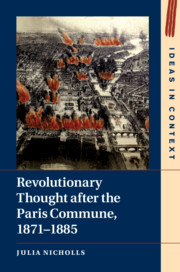Refine search
Actions for selected content:
8 results
Chapter 2 - Paris and the Nation’s Politics
- from Part I - Paris: City, Politics, and Society
-
-
- Book:
- Debussy in Context
- Published online:
- 23 May 2024
- Print publication:
- 23 May 2024, pp 16-24
-
- Chapter
- Export citation
Chapter 16 - Planet of the People III: An Urban Majority Takes Its Space
- from Part Three - Cities of Hydrocarbon
-
- Book:
- Earthopolis
- Published online:
- 10 May 2022
- Print publication:
- 09 June 2022, pp 387-412
-
- Chapter
- Export citation
5 - Royalists versus Vandals, and the Cult of the Old Regime (c.1860–1880)
-
- Book:
- The Purchase of the Past
- Published online:
- 01 June 2020
- Print publication:
- 25 June 2020, pp 203-242
-
- Chapter
- Export citation
Chapter 1 - The Commune as Quotidian Event
- from Part I - The Paris Commune and Accounting for Failure
-
- Book:
- Revolutionary Thought after the Paris Commune, 1871–1885
- Published online:
- 12 July 2019
- Print publication:
- 18 July 2019, pp 21-48
-
- Chapter
- Export citation
Introduction
-
- Book:
- Revolutionary Thought after the Paris Commune, 1871–1885
- Published online:
- 12 July 2019
- Print publication:
- 18 July 2019, pp 1-18
-
- Chapter
- Export citation
Chapter 2 - The Commune as Violent Trauma
- from Part I - The Paris Commune and Accounting for Failure
-
- Book:
- Revolutionary Thought after the Paris Commune, 1871–1885
- Published online:
- 12 July 2019
- Print publication:
- 18 July 2019, pp 49-78
-
- Chapter
- Export citation
Part I - The Paris Commune and Accounting for Failure
-
- Book:
- Revolutionary Thought after the Paris Commune, 1871–1885
- Published online:
- 12 July 2019
- Print publication:
- 18 July 2019, pp 19-78
-
- Chapter
- Export citation

Revolutionary Thought after the Paris Commune, 1871–1885
-
- Published online:
- 12 July 2019
- Print publication:
- 18 July 2019
